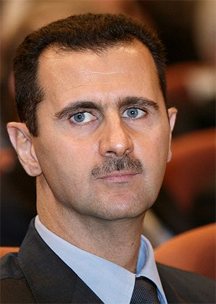The Ministry of Foreign Affairs yesterday defended Guyana’s abstention from a United Nations vote on the strife in Syria, saying that the international response can only succeed if it is united and addresses all sides of the conflict.
In a statement, the ministry said that the August 3rd resolution passed by the majority of the United Nations General Assembly fell short of contributing to a viable political solution to the Syrian conflict, while noting that the government found the endorsement of a call for Syrian President Bashir al-Assad to step down was unacceptable.

The statement from the ministry followed a report in Stabroek News about Guyana’s abstention from the UN vote, which was subsequently condemned by the main opposition APNU. The coalition vice-chairman Dr. Rupert Roopnaraine earlier this week said that government’s preoccupation with the opposition has sullied its stance on Syria. “They seem to have the opposition on their brain. The reason they abstained on the Syrian vote is because the resolution that was presented to the General Council did not allocate sufficient blame to the opposition for contributing to the massacres there,” he said.
The resolution condemned the country’s indiscriminate use of heavy weapons in civilian areas and its widespread violations of human rights in the strife-torn country, but Guyana’s representative was quoted as saying that the international community could not turn a blind eye to the harmful acts of opposition groups, and that harmful acts committed by all must be examined.
Yesterday, the ministry maintained that the situation in Syria is a complex one, exacerbated by differing interests of the many actors on the ground and which has seen the people of Syria being the greatest casualties. “As a.concerned member of the international community, Guyana continues to urge a peaceful resolution in accordance with the principles of international law,” it said.
Having taken note of recent commentary in the media and by the opposition in respect of Guyana’s abstention, the ministry said that the government has followed with grave concern the unfolding situation in the Syrian Arab Republic and the increasingly heavy toll it is taking on the people of that country.
According to United Nations reports, serious violations of human rights and of international humanitarian law have been perpetrated by all sides to the conflict.
‘Complex’
The statement said that government on two previous occasions supported resolutions of the General Assembly strongly condemning violations of human rights and of international humanitarian law by the Syrian authorities although the resolutions paid “scant attention” to the actions of other parties. The ministry said that the most recent of these was General Assembly resolution 66/253 A, which mandated the appointment of the Joint Special Envoy of the United Nations and the Arab League.
“Guyana’s abstention vote on August 3 has to be seen in the context of the evolving situation on the ground, the urgent need for a political settlement and for an efficacious response by the international community within the framework of the United Nations Charter and international law.
As some local reporting has illustrated, the situation is evidently complex with multiple interests being prosecuted by various actors both internal and external,” the ministry said.
It added that a number of changes have taken place on the ground, which led to a reconsideration of Guyana’s position. “The situation has become increasingly militarised and the presence of terrorist elements has been recognised as contributing to the intensification of the conflict,” the ministry explained. “The international community has grown more divided, resulting in the inability of the Security Council to agree on an appropriate response. As the outgoing Joint Special Envoy of the United Nations and the Arab League has observed, the challenges within Syria have been compounded by the lack of unity on the part of the international community,” it added.
The government, the ministry emphasised, is of the view that the interests of the Syrian people will be served by an immediate end to the violence and bloodshed by all parties and the provision of the necessary humanitarian and other support as envisaged in the six-point plan endorsed by the Security Council. “Whatever the perceptions of the parties involved, the focus of attention has to be on the search for a viable political solution. For the response to have any realistic chance of succeeding, the international community needs to be united and to adopt a comprehensive approach addressing all sides to the conflict. The mere singling out of one party will not suffice,” it argued.
It added that in the “considered opinion” of the government, “the resolution as drafted did not contribute to the achievement of these objectives. Instead of unifying the international community, it essentially reproduced within the larger General Assembly the divisions that were evident in the Security Council. In this regard, it was a missed opportunity.”
Further, it said that the resolution contained specific provisions which the government viewed as unacceptable. “The resolution welcomes an Arab League resolution calling on the President of Syria to step down, a call that Guyana could not logically support since this was outside the accepted international norms of democratic governance processes,” the ministry said.
“The resolution also encourages cohesion among the opposition, many of whom are unknown to the international community, and some of whom are identified by the UN Human Rights Council’s Commission of Inquiry with the perpetration of human rights violations, and with contributing to the escalation of the conflict. Guyana could not blindly support opposition elements under such circumstances,” it added.
Guyana was among several countries that abstained from the UN General Assembly vote. The Assembly, however, voted overwhelmingly in support of the resolution. Gravely concerned by the escalating violence in Syria, the UN General Assembly strongly condemned Damascus’ indiscriminate use of heavy weapons in civilian areas and its widespread violations of human rights, demanding that all parties “immediately and visibly” commit to ending a conflict that UN Secretary-General Ban Ki-moon called “a test of everything this organisation stands for.”









